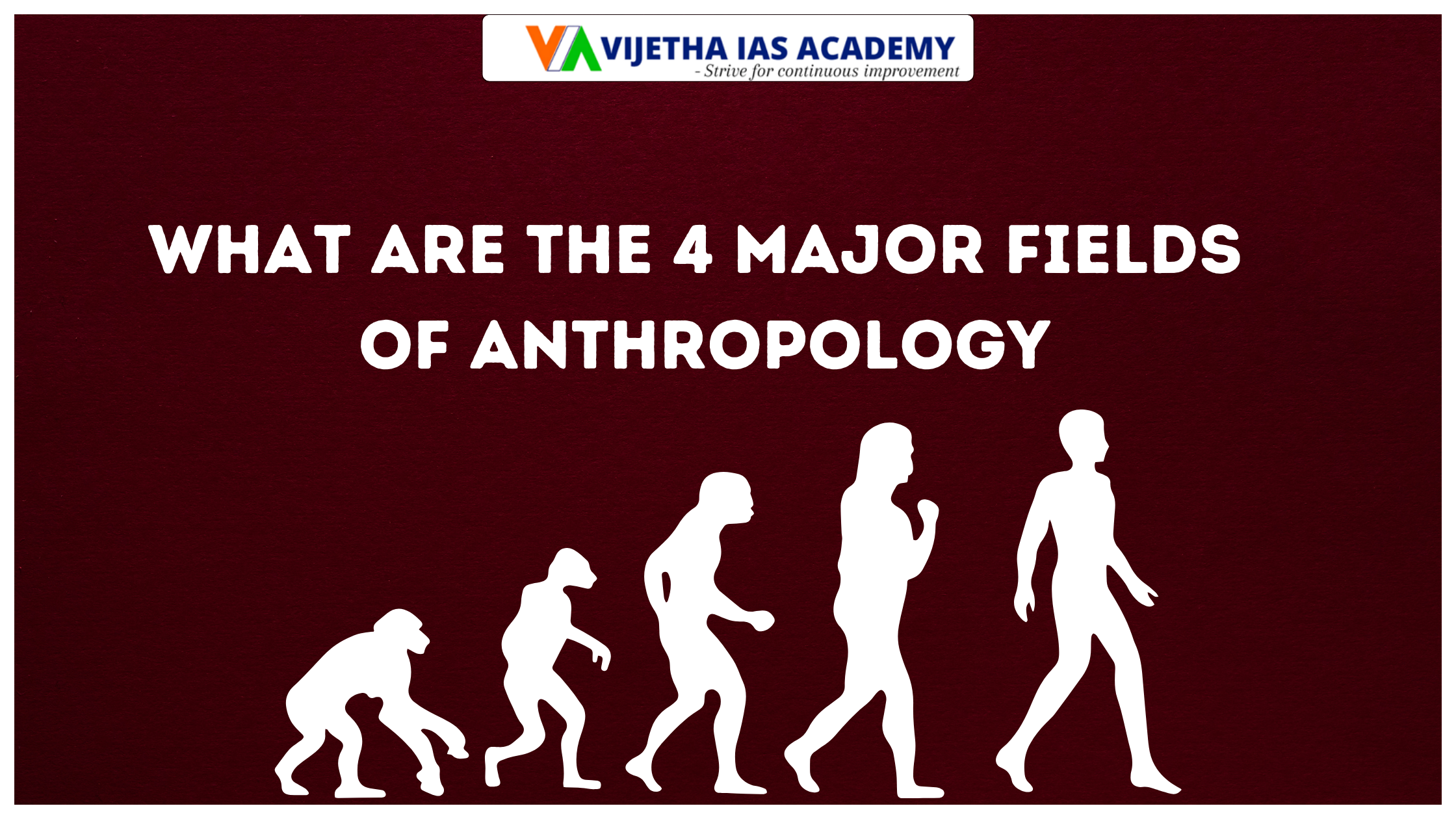
What Are the 4 Major Fields of Anthropology?
Anthropology is a multifaceted discipline that explores the complexities of human life through various lenses. It is broadly divided into four major fields, each focusing on different aspects of human existence and societies. Understanding these fields is crucial for anyone pursuing a career in anthropology, particularly for UPSC aspirants who choose Anthropology as their optional subject. This article provides an in-depth look at the four major fields of anthropology and highlights how Vijetha IAS Academy can support your studies in these areas.
1. Cultural Anthropology
Overview
Cultural Anthropology, often considered the core of anthropology, studies contemporary human cultures and societies. It examines how people live, interact, and organize their lives within various cultural contexts. This field focuses on understanding the norms, values, and practices that shape human behavior and social structures.
Key Areas of Study
- Social Structures: Investigates how societies are organized, including kinship systems, political organizations, and economic practices.
- Cultural Practices: Explores rituals, customs, language, and beliefs that characterize different cultures.
- Ethnography: Utilizes fieldwork methods to collect detailed descriptions of cultures through participant observation and interviews.
- Comprehensive Study Materials: Detailed notes and resources that cover essential concepts, theories, and case studies in cultural anthropology.
- Expert Instruction: Guidance from experienced faculty members like NP Kishore, who provide insights into cultural dynamics and ethnographic research.
2. Physical Anthropology
Overview
Physical Anthropology, also known as Biological Anthropology, focuses on the biological and evolutionary aspects of humans. It explores how human beings have evolved over time and how biological factors influence human behavior and adaptation.
Key Areas of Study
- Human Evolution: Studies the fossil record and evolutionary processes that have shaped human species.
- Genetics: Examines genetic variation and its role in human development and adaptation.
- Primatology: Investigates non-human primates to understand the evolutionary links between them and humans.
- Osteology: Analyzes human skeletal remains to infer health, diet, and lifestyle of past populations.
- Specialized Resources: Access to in-depth materials on human evolution, genetics, and primatology, crucial for understanding physical anthropology.
- Expert Faculty: Instruction from knowledgeable educators who can clarify complex concepts and guide you through advanced topics in biological anthropology.
3. Archaeology
Overview
Archaeology focuses on the study of past human societies through their material remains. By examining artifacts, structures, and other physical evidence, archaeologists reconstruct ancient cultures and understand their development over time.
Key Areas of Study
- Excavation: The process of uncovering artifacts and structures from archaeological sites.
- Artifact Analysis: Examines objects made or used by past cultures to understand their daily lives, technologies, and social structures.
- Site Preservation: Involves the conservation and management of archaeological sites to protect them for future research and education.
- Detailed Study Guides: Comprehensive materials on archaeological methods, site analysis, and historical periods.
- Practical Insights: Guidance on how to approach archaeological research and interpretation, helping you understand the significance of various discoveries.
4. Linguistic Anthropology
Overview
Linguistic Anthropology explores the relationship between language and culture. It examines how language influences social life and how it reflects and shapes cultural identities and practices.
Key Areas of Study
- Language Structure: Analyzes the grammar, syntax, and phonetics of languages.
- Language and Identity: Investigates how language reflects and constructs social identities and cultural affiliations.
- Language Change: Studies how languages evolve over time and how they adapt to social and cultural changes.
- In-Depth Resources: Study materials on linguistic theories, language structure, and sociolinguistics.
- Expert Advice: Instruction from experienced faculty who provide insights into the complex interactions between language and culture.
Integrating the Four Fields: A Holistic Approach
While each of the four fields of anthropology focuses on different aspects of human existence, they are interrelated and often overlap. A holistic approach to anthropology involves integrating insights from cultural, physical, archaeological, and linguistic anthropology to gain a comprehensive understanding of humanity.
How Vijetha IAS Academy Integrates These Fields
Vijetha IAS Academy’s approach to teaching anthropology integrates all four major fields:
- Integrated Curriculum: The academy’s curriculum is designed to provide a cohesive understanding of how each field contributes to the broader study of anthropology.
- Cross-Disciplinary Insights: Faculty members encourage students to explore connections between cultural, physical, archaeological, and linguistic aspects of human life.
- Interactive Learning: Engaging online classes and discussion forums allow students to discuss and analyze how different anthropological perspectives intersect.
Conclusion
The four major fields of anthropology—Cultural Anthropology, Physical Anthropology, Archaeology, and Linguistic Anthropology—each offer unique insights into human life and societies. Understanding these fields is essential for anyone pursuing a career in anthropology or preparing for the UPSC Civil Services Examination. Vijetha IAS Academy’s comprehensive resources, expert guidance, and integrated approach provide valuable support in mastering these fields. By leveraging the academy’s expertise, you can gain a deeper understanding of anthropology and apply its principles effectively in your academic and professional endeavors.
